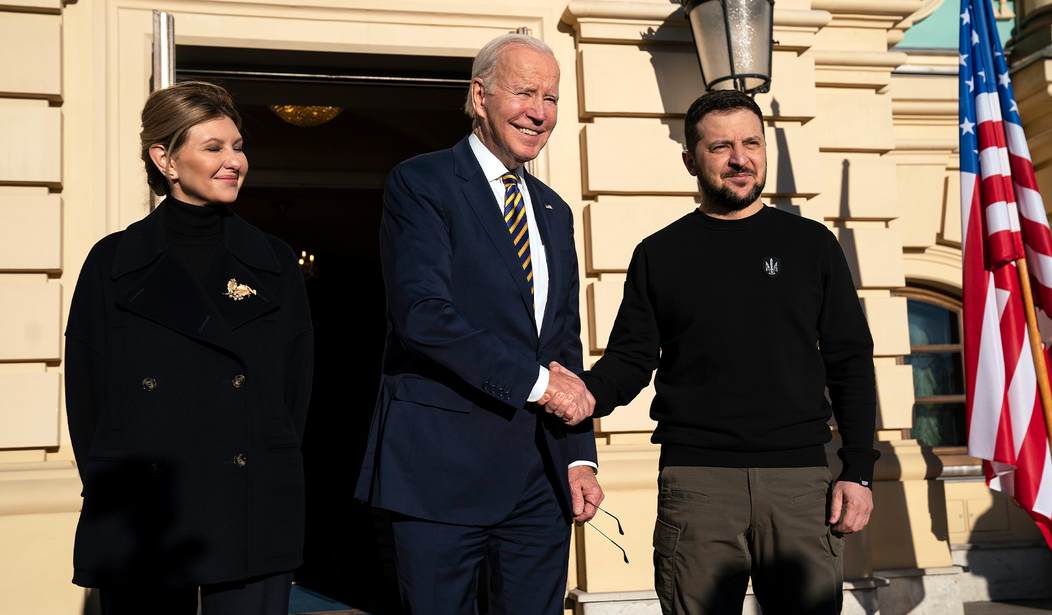President Joe Biden's surprise visit to Ukrainian premier Volodymyr Zelensky in Kyiv earlier this week was an unmistakable sign of solidarity with Ukraine on the one-year anniversary of Russian kingpin Vladimir Putin's reckless, unjust invasion. To the extent Biden's aim was to send such a symbolic message to Moscow and its allies, he succeeded.
Unfortunately, Biden's trip, especially seen in concert with recent similar actions such as Zelensky's December speech before a joint session of Congress and even Senate Minority Leader Mitch McConnell's (R-KY) sartorial choice to wear a Ukrainian flag-colored necktie to Biden's State of the Union address earlier this month, raises a number of discomfiting questions about the Washington, D.C. uniparty's seemingly interminable commitment to prolonging this Eastern European quagmire. On the one-year anniversary of the culmination of Europe's first extended land war since World War II, here are some pressing questions for establishment politicians from both major political parties.
No. 1: What is the meaning of "as long as it takes"? In Kyiv, Biden reiterated that the U.S. "will remain with Ukraine as long as it takes." This presumably entails both a moral and, more relevant, fiscal commitment -- indeed, Biden promised a new tranche of military aid to Ukraine, on top of the $113 billion in aid U.S. taxpayers dispensed with in 2022, and on top of recently announced top-tier materiel such as Patriot missile defense systems. But items such as Patriot missile defense systems and M142 HIMARS rocket launchers don't grow on trees; resources are necessarily scarce, and each additional item we ship off into a proxy war against a nuclear-armed hegemon necessarily depletes our own military arsenal. Furthermore, America is massively indebted with soaring annual budget deficits. And Chinese President Xi Jinping surely grins as America strips bare our military and ships off the parts to Europe, not Asia. So how long is "as long as it takes" -- and, related, do we simply not care at all about the costs?
Recommended
No. 2: Is the U.S. national interest in the conflict synonymous with Ukraine's national interest? The bipartisan foreign policy establishment's absolutist stand with Ukraine -- at seemingly all costs, "as long as it takes," and so forth -- implicitly conflates the national interests of the U.S. and Ukraine. After all, if the U.S. is that existentially committed to Ukrainian "victory" -- whatever precisely that entails, and however Zelensky defines it -- then it follows that our national interest in the conflict is precisely coterminous with Ukraine's own national interest. But although there is strong overlap, this is simply not the case; the national interests are not coterminous. Ukraine's national interest is indeed the maximalist stance Zelensky espouses -- namely, refusal to countenance yielding even a square foot of territory in the Donbas (or Crimea). The U.S. national interest, by contrast, is definitely served by Zelensky's remaining in power in Kyiv and not being toppled for an Alexander Lukashenko-style Moscow puppet; crucially, however, there is exceedingly little (if any) U.S. interest in where the exact national boundary lines are drawn in eastern Ukraine, where the population is often closely divided between ethnic Ukrainians and ethnic Russians. The crude post-Soviet dissolution boundaries in this part of the world are not akin to Moses descending Mount Sinai with the Word of God.
No. 3: Is the U.S. fearful of all-out war with Russia? Russia is the country with the single most confirmed nuclear weapons in the entire world: 6,255, as of 2021. (The U.S. was second, with 5,550 at that time.) As Zelensky sometimes flirts with openly calling for World War III, and continually endeavors to drag NATO -- and thus, the U.S. -- further into the conflict, does the prospect of cataclysmic nuclear war with Russia not cross the minds of the Washington uniparty and bipartisan foreign policy "blob"? That fear, if anything, should be exacerbated by Putin's de facto withdrawal of Russia, over the past week, from the New Strategic Arms Reduction Treaty (New START). Putin (loathsomely) speculates fairly openly about deploying nuclear weapons -- all while the U.S., as well as European nations such as Germany and Poland, ship off increasingly sophisticated materiel. Is no one here interested in de-escalation and avoiding what Biden not-so-reassuringly referred to last October as nuclear "Armageddon"?
No. 4: Has the U.S. learned anything about "endless wars"? The American public is naturally war-weary after decades of failed regime change wars and moralistic nation-building crusade boondoggles. There is simply no political appetite right now for a dramatically prolonged military engagement -- especially one in Europe, while our actual top geopolitical threat, China, flies spy balloons over our continent unimpeded and tests nuclear-capable hypersonic missiles around the world. The Washington uniparty's desire for escalation in Eastern Europe may aid rapacious Beltway defense contractors, but it is manifestly contrary to the expressed interests of the American people, who would rather our elected officials focus instead on our own porous southern border with Mexico. In every way, the Biden administration's current approach is "America Last," not "America First."
No. 5: What is the U.S.'s long-term plan to deal with Russia? It is unclear at best whether anyone in a foreign policy decision-making capacity has given a second of thought to what U.S.-Russian relations might possibly look like when this war is finally over. At this rate, and absent a course correction toward de-escalation and direct mediated negotiation between the warring parties, Moscow will loathe America and Europe after the conflict even more than they did prior to the conflict's onset. But given that China, and not Russia, is this century's dominant threat to America, a shrewder and more forward-looking approach to the conflict would at least lay the groundwork for possibly peeling Russia away from China and slightly closer to the Western sphere of influence after the war is over. Unfortunately, there is thus far no reason to believe this has a chance.
Political leaders of both parties should be asked these important questions. The stakes, as Biden's "Armageddon" slip of the tongue inadvertently revealed, could not possibly be higher.
To find out more about Josh Hammer and read features by other Creators Syndicate writers and cartoonists, visit the Creators Syndicate website at www.creators.com.

























Join the conversation as a VIP Member